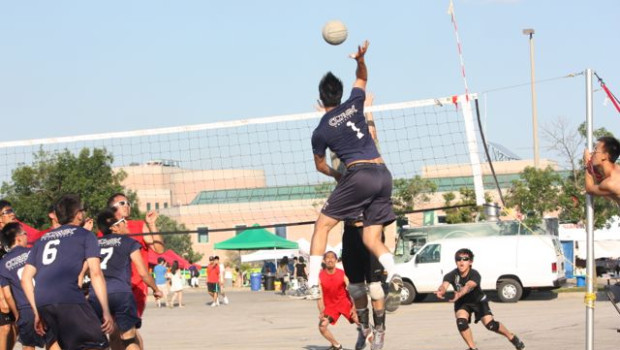 Opening to a Boston theatre crammed to capacity with an audience that included current and former players of 9-Man and the mayor of Massachusetts’ city of Malden, 9-Man made its theatrical debut last night at the 2014 Independent Film Festival of Boston. It was an instantaneous hit.
Opening to a Boston theatre crammed to capacity with an audience that included current and former players of 9-Man and the mayor of Massachusetts’ city of Malden, 9-Man made its theatrical debut last night at the 2014 Independent Film Festival of Boston. It was an instantaneous hit.
9-Man spotlights the uniquely Chinese-American sport of 9-man, an eighty-year old variant of volleyball popular in the southern Chinese city of Toisan and surrounding region as well as in Chinatowns throughout North America.
As a documentary, 9-Man is richly layered. Although a film about a virtually unknown sport with deep roots in Chinese American history runs the risk of being unwatchably dry, 9-Man is instead a surprisingly funny, sharp and nuanced conversation about contemporary Asian Americana.
Film-maker Ursula Liang (@ursulaliang), whose background is in sports journalism, allows 9-Man to tell its story through intimate conversations with several 9-Man players, each amateur athletes who fully dedicate their summers to training as part of the sports’ four more competitive teams: the Boston Knights, the Boston Freemasons, the D.C. CYC, and the Toronto Connex. Each team is hoping to win the annual Nationals tournament, a Labour Day weekend contest that thus far been dominated by the San Francisco Westcoast, a self-professed ringer team consisting mostly of professional (6-Man) volleyball players who aren’t really part of the 9-Man culture or community.

Liang’s savvy decision to focus on a single season of 9-Man volleyball infuses a palpable drama into the film that compels its viewers to invest and engage in the 9-Man teams’ underdog journey to dethrone the San Francisco Westcoast. As a Canadian, you know I was rooting for the Toronto Connex; but I was also surprised to find how quickly I was consumed by Connex’s captain Jeff Chung‘s dedication to all aspects (both cultural and athletic) of the sport, and his yearning for the Nationals trophy. Combined with wide shots of 9-Man’s innate high-energy action and the hilarious antics that come when you turn a camera upon a bunch of men doing something involving both sports and alcohol, 9-Man becomes one of those rare documentaries that never feels like a documentary: it is unerringly engaging and funny, while simultaneously informative and thought-provoking. Told through intimate conversations with several 9-Man players, the film effortlessly wends its way from Chinese American history and exclusion, to ideas about multiracial identity and cultural authenticity, to masculinity and stereotypes, to the increasing gentrification of North American Chinatowns.
From a pure production standpoint, 9-Man hardly betrays Liang’s status as a rookie film-maker. Despite some rough raw footage with poor lighting and audio quality, the finished product of 9-Man is unexpectedly polished. The film’s seamless editing by Michelle Chang is particularly noteworthy in building the complex narrative viewpoint of the film, and was augmented by smart and unobtrusive use of animation. Scott “Chops” Jung (of the Mountain Brothers and his recent collaborative project, “Strength in Numbers“) delivers — as always — some great beats to accompany some of the film’s key scenes as well.
But where the film truly stands out is in its incisive and unflinching presentation of its subject — 9-Man and its players — in both its beauty and its ugliness.
Several interview subjects are followed over the course of one summer as they prepare for the Labour Day Nationals, and we see moments of extreme dedication and athleticism. 9-Man is presented as a sport with a deep history, one that helped to bind Chinese American men together nearly a century ago in the face of their ostracism from mainstream American culture, and which is now a sport that helps build kinship and brotherhood among today’s Asian American male youth. For some biracial Asian American players who can’t speak a word of Chinese and whose families have long since moved away from Chinatown and into the suburbs, 9-Man is one of their only ties to their “Asian” side. For one player, who realizes over the course of the summer that the portrayed season will be his last, his intimate retirement interview captured in the final moments of the Labour Day tournament is heart-wrenchingly private and emotional. Throughout the film, 9-Man’s status as a unique cultural and community tradition that has been passed from father-to-son for nearly a century is undeniable. As the credits roll, we cannot escape the melancholy fear that 9-Man is truly a sport at-risk of disappearing. It feels both inevitable and unforgivable that this sport might surrender its essence to the economic and cultural erosion of this nation’s Chinatowns, or that it might fade away with the unrelenting passage of time as older players”age out” while younger men drift away from their Asian American history and heritage.

On the one hand, we become convinced that 9-Man is a piece of our heritage that is worth protecting; yet, Liang bravely refuses to flatly glorify the sport by whitewashing away its blemishes. Early in the film, Liang allows the camera to linger over one player who is drunkenly rambling after what seems like his eleventh beer: this human moment is both hilarious and a reminder that the sport is played by real, sometimes flawed, people. One young Canadian biracial player routinely refers to himself as “half Oriental” — a point of particular chagrin for me. Another who works construction at a trainyard makes an insensitive joke about coolie labour on the transcontinental railroads. A fight breaks out at the Labour Day banquet on the night before the tournament, and the cops are called as the restaurant is evacuated. But rather than to shy away from these more human moments, Liang courageously presents them as a counter-point to 9-Man’s cultural and athletic beauty: what results is a humanized portrayal of this streetball community that in the very act of juxtaposition of beauty with ugliness produces a complexity that innately challenges stereotypes.
One of the most controversial aspects of the film is its unflinching exploration of 9-Man’s “content rule”, a written rule established in 1991 that reinforces the racial segregation of the sport by preventing non-East Asian players from playing. According to the league’s official rulebook, 2/3rds of the players of each team must be “100% East Asian” (and a list of qualifying ethnicities, including Chinese, Japanese, Vietnamese, Filipino and more recently Mongolian are included; South Asians are excluded) whereas the other 1/3rd of players can be “less than 100% East Asian”, but still must be able to prove East Asian heritage. Teams that violate the “content rule” can be disqualified, as nearly happens in one scene when a team’s two Blasian players have their “Asian-ness” challenged. All players at risk of a challenge are informally required to bring their pedigrees — a family tree and birth certificate — to every game.
This rule is, at base, racially and politically ugly. Created to try and protect the sport’s cultural authenticity as a “Chinese American sport” and its players from an influx of allegedly athletically superior Black and White men, the rule draws upon unfortunate anti-Black stereotypes while recreating the rationale behind the racial segregation we witnessed prior to the integration of Major League Baseball (a sport that was, until integration, believed to be a “White man’s sport”). Ironically, the film also documents how the rule fails to achieve its secondary goal: the San Francisco Westcoast are led by an absurdly tall biracial professional volleyball player who enters the tournament mainly to win a trophy, and he professes to not give a crap about preserving the cultural heritage of 9-Man.
To 9-Man‘s credit, Liang courageously faces the controversial “content rule” head-on in her film, and takes the time to present both the league’s reasoning for writing the rule as well as the (perhaps unintentional) racial absurdity of its enforcement that results in among other consequences a young South Asian player being decreed as “not Asian enough” to play. In so doing, Liang sparks a conversation not just on the “content rule” specifically, but on the more universal conundrum of preserving tradition within the changing face of Asian Americana: Who or what do we consider to be part of the Asian and Asian American identity and community? What steps can and should we (or should we not) take in preserving Asian American history and heritage? That the film raises these thorny questions in a fair and balanced manner is a testament to its strength as a documentary.
If I have one complaint, it is that the film was not able to present and discuss the gender politics of the 9-Man sport, which prohibits female players. Liang informed us in the Q&A that this was a subject that was cut from the film to preserve running time; I hope it will appear on the DVD.
Ultimately, 9-Man is an engrossing and carefully constructed film that deserves widespread distribution, not just at independent film festivals but in Asian American studies courses across the nation. I envision this film becoming a staple of introductory Asian American courses, used as a stepping-off point for further discussion of Asian American identity, masculinity, history, gentrification and stereotype threat. In short, I have no doubt that in the coming years 9-Man will, like Better Luck Tomorrow and Vincent Who?, cement its status as one of Asian America’s must-see films.
9-Man (@9ManDoc) will be screened in May at the L.A. Asian Pacific Film Festival and I caught something about a New York City showing, but can’t find the details on the website. If you can catch its West Coast screenings, you should definitely go. Either way, please spread the word about 9-Man through social networking and sharing to help generate buzz to get this film into more film festivals in the coming months.

